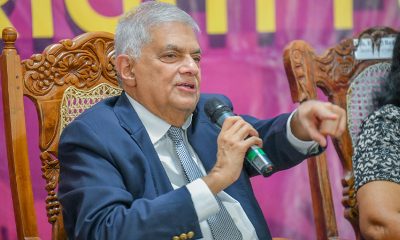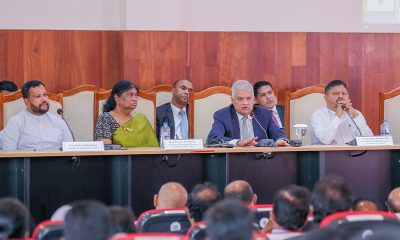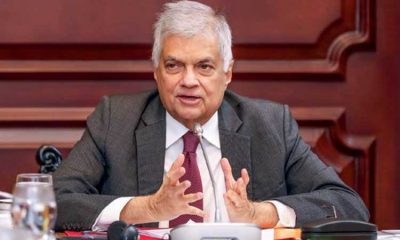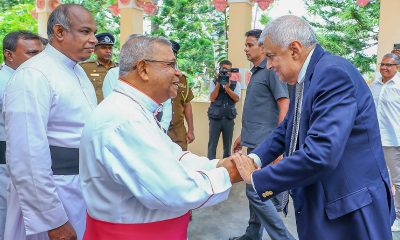Business
President advocates legalising reforms in IMF framework
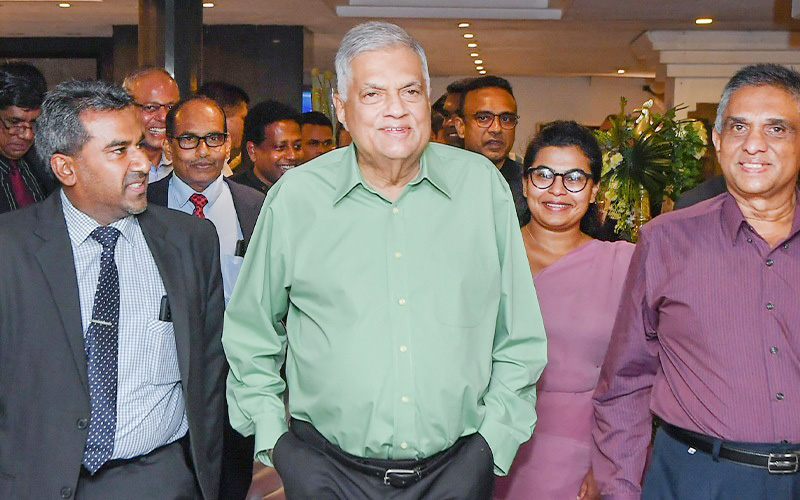
by Sanath Nanayakkare
President Ranil Wickremesinghe has stressed on the importance of legalising the economic, social and governance agreements Sri Lanka has entered into with the IMF.
He has said so addressing a group of lawyers at the Mahaweli Reach Hotel in Kandy on April 7.
He has pointed out that such a move would pave the way for all the people of the country to benefit from the ongoing IMF programme as it contains critical economic reforms, vital social inclusion measures and governance diagnostics which would help attract substantial external support for Sri Lanka.
“While we are pursuing the IMF programme to achieve fiscal consolidation, we need to moderrnise the legal system to effectively implement the government’s programme aimed at fostering rapid economic growth in the country,” he has said.
Addressing the lawyers, he has sought their support for these initiatives, emphasising the significance of their involvement in advancing these efforts.
” There are two options for us. Are we going to continue with the current economic system or are we going to bolster the country’s economy by prioritising a competitive export-driven approach? What should we do to avoid an economic crisis in the future? What strategic economic policies and initiatives should we follow in the long term to achieve resilience and sustainability in our economic system?”
“Sri Lankan entrepreneurs are doing well in tea and apparel sectors and we need to replicate that success in new sectors. For this, we need significant reforms in our commercial laws, including the updating of outdated laws and the implementation of modern legal frameworks accepted globally.”
“It is important to enact new environmental laws and climate change laws, along with new financial and commercial laws. Efforts are underway to draft new banking laws. These initiatives are part of a broader plan to establish a new legal system within the country over the next decade for long-term development in Sri Lanka.”
“The envisaged Women Empowerment Act and Gender Equality Act will empower Sri Lankan women to become dynamic stakeholders of the society and economy. These legislative efforts are envisioned to create a proper legal environment for economic growth and social advancement.”
“I will be presenting the relevant bills to parliament for debate in a couple of months to achieve these goals, whose implementation will lead to desirable outcomes for the people in the next two decades. I myself and some others here may not live to see the fruition of such initiatives, therefore, I urge young lawyers to take the lead in pushing forward the legal reforms necessary to realise the full potential of Sri Lanka,” the President has said.
Business
LankaPay Technnovation Awards to spotlight inclusive FinTech as digital payments expand across Sri Lanka

Sri Lanka’s digital payments revolution is gathering unprecedented momentum, with more than 260 government institutions now integrated into the national digital payments ecosystem, marking a decisive shift toward financial transparency, efficiency and inclusion, officials said at a press briefing held at the Hilton Colombo Residences.
The announcement coincided with the launch of the eighth edition of the LankaPay Technnovation Awards 2026 by LankaPay, Sri Lanka’s national payment network, under the theme “Inclusive FinTech,” recognising financial institutions, fintech companies and government entities that have expanded access to secure and convenient digital financial services across the country.
Chief Executive Officer of LankaPay, Channa de Silva, said the rapid expansion of digital payment adoption reflects a structural transformation in Sri Lanka’s financial architecture.
“The growth we are witnessing in digital payments is not merely technological progress—it represents a fundamental shift in how financial services are delivered and accessed. Our national payment infrastructure is enabling real-time, secure and inclusive transactions that empower individuals, businesses and government institutions,” de Silva said.
He said LankaPay’s continued investment in interoperable and accessible payment infrastructure is helping bring more citizens into the formal financial system while strengthening economic governance.
“Our objective is to ensure digital payments are accessible to all Sri Lankans, from urban centres to the most remote communities. Inclusive digital finance strengthens economic participation and supports sustainable national development,” he said.
Officials said the onboarding of 260 government institutions within a year represents a remarkable leap from just eight institutions previously connected, underscoring the State’s accelerating digital transformation agenda.
“This expansion required extensive engagement across the country. Our teams worked directly with government departments, municipal councils and regional authorities to ensure successful integration into the digital payments ecosystem,”
LankaPay officials said, noting that institutions from regions including Kurunegala, Jaffna and Trincomalee had recently been onboarded.
Authorities said the digital integration of government services improves transparency, reduces administrative inefficiencies and enhances public convenience, while enabling better financial oversight and accountability.
The LankaPay Technnovation Awards, first introduced in 2017, have become Sri Lanka’s benchmark platform recognising excellence and innovation in payment technology, honouring institutions that have demonstrated leadership in advancing digital payments and financial inclusion.
The grand awards ceremony is scheduled to be held on March 24 at the Cinnamon Life under the patronage of Nandalal Weerasinghe, Governor of the Central Bank of Sri Lanka, as Chief Guest. Eranga Weerarathne, Deputy Minister of Digital Economy, and Hans Wijayasuriya, Chief Advisor to the President on Digital Economy, will attend as Guests of Honour.
Officials said the awards recognise outstanding achievements across multiple categories, including financial inclusivity, customer convenience, digital government payments and cross-border payment enablement, reflecting the breadth of innovation taking place within Sri Lanka’s financial services sector.
By Ifham Nizam
Business
HNB supports Sri Lanka’s recovery with record advances growth

HNB Group delivered strong performance in 2025, with Group Profit After Tax (PAT) reaching Rs 49.8 Bn, reflecting the continued progress. The Bank’s PAT stood at Rs 45.4 Bn, supported by robust balance sheet expansion and sustained improvements in asset quality.
Commenting on the performance, Nihal Jayawardena, Chairman of HNB PLC, stated,”The year 2025 marked a decisive shift in Sri Lanka’s economic trajectory, supported by improving macroeconomic fundamentals, renewed private sector confidence, and continued progress in national reform efforts. HNB’s strong balance sheet expansion, disciplined risk management, and sustained investment in digital and operational capabilities position the Bank to play an essential role in supporting the country’s revival”.
“While the year concluded with the severe impact of Cyclone Ditwah, the resilience demonstrated by communities and institutions underscored the importance of a banking sector that remains agile, responsive, and deeply committed to national progress. We will continue to work closely with stakeholders to mobilise capital, rebuild affected livelihoods, and strengthen long‑term economic stability.”
Despite strong credit growth, net interest margins remained under pressure amid an accommodative monetary policy stance. Net Interest Income declined marginally by 0.6% year‑on‑year, reflecting the broad reduction in market interest rates, and the recognition of a portion of overdue interest from the restructuring of Sri Lanka Sovereign Bonds (SLSBs) in December 2024, which temporarily boosted interest income in the previous year. However, the decrease in net interest income was moderated by the increase in interest income from loans and advances, supported by the expansion in the loan book, and the growth in CASA deposits.
Non-fund-based income provided a strong counterbalance, with Net Fee and Commission Income increasing by 28.9% year-on-year on the back of higher card usage and a sharp increase in digital transactions. The significant increase in the demand for trade related services on the back of the reopening of vehicle imports and improving trade activity, saw trade finance emerge as one of the key contributors to non-fund income in the current year. Furthermore, Exchange income rose to Rs 6.3 Bn during the year, reversing the loss of Rs 2.9 Bn recorded in 2024.
Prudent risk management, disciplined underwriting and focused recovery efforts supported a significant improvement in asset quality during the year. The Stage 3 portfolio recorded a net reduction alongside an impairment reversal of Rs 9.2 Bn, following the recognition of Rs 2.2 Bn in post‑model adjustments made prudently for loan exposures with potential vulnerability arising from Cyclone Ditwah.
Business
HNB Assurance delivers industry leading 42% revenue (GWP) growth and 28% rise in profits (PAT)

HNB Assurance PLC reported an outstanding financial performance for the year ended 31st December 2025, delivering a 42% year-on-year growth in Life Insurance Gross Written Premium (GWP), this along with the growth rate in Renewals are the highest in the industry.
Life GWP reached Rs. 19.49 Bn compared to Rs. 13.71 Bn in 2024, reflecting strong New Business generation and Renewal Collection. Net Written Premium grew even faster at 43% to Rs. 18.44 Bn, highlighting the quality and sustainability of the Company’s topline expansion.
Commenting on the results, Chairman Stuart Chapman stated, “The year under review was marked by gradual macroeconomic stabilisation, improved investor sentiment and a more predictable policy environment. Although the economy continues to recover from prior volatility, we are beginning to see renewed financial confidence among individuals and businesses. Against this backdrop, HNB Assurance has delivered strong growth in both revenue and profits, while maintaining robust capital adequacy and prudent risk management. Our improvement in top line, profitability and balance sheet strength demonstrates the resilience of our business model and our ability to navigate changing economic conditions which are reflected in an ROE which increased to 18.5% from 16.9% a year earlier.”
Profit Before Tax increased by 28% to Rs. 3.03 Bn from Rs. 2.36 Bn in the previous year, while Profit After Tax (including Life Surplus Transfer) rose by 28% to Rs. 2.12 Bn compared to Rs. 1.66 Bn in 2024. Earnings Per Share improved by 28% to Rs. 14.15 from Rs. 11.04, reinforcing the Company’s ability to consistently translate business growth into enhanced shareholder value. In line with this strong performance, the Board of Directors has proposed a first and final dividend of Rs. 5.00 per share for 2025, representing a 28% increase over the Rs. 3.90 per share declared in the previous year.
-

 Features5 days ago
Features5 days agoWhy does the state threaten Its people with yet another anti-terror law?
-

 Features5 days ago
Features5 days agoReconciliation, Mood of the Nation and the NPP Government
-

 Features5 days ago
Features5 days agoVictor Melder turns 90: Railwayman and bibliophile extraordinary
-

 Features4 days ago
Features4 days agoLOVEABLE BUT LETHAL: When four-legged stars remind us of a silent killer
-

 Features5 days ago
Features5 days agoVictor, the Friend of the Foreign Press
-

 Latest News7 days ago
Latest News7 days agoNew Zealand meet familiar opponents Pakistan at spin-friendly Premadasa
-

 Latest News7 days ago
Latest News7 days agoTariffs ruling is major blow to Trump’s second-term agenda
-

 Latest News7 days ago
Latest News7 days agoECB push back at Pakistan ‘shadow-ban’ reports ahead of Hundred auction


